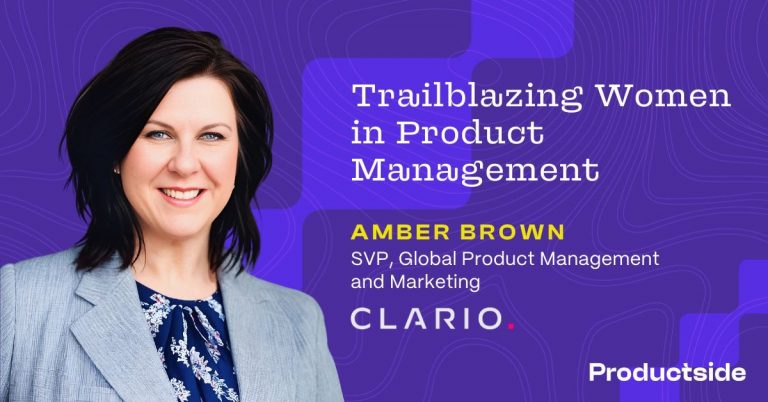
For our next installment of our Women in Product Management Series, I interviewed Elena Leonova, Senior Vice President of Product at Spryker.
Product Managers don’t need to be the technical experts, but they do need to understand the business implications of the technical decisions, as engineering teams don’t have the business background.
Elena Leonova
Senior Vice President of Product, Spryker
Nicole: Elena, thank you for agreeing to participate in our series so we can showcase diverse female Product Management leaders from all over the world.
Elena: Thank you. This is a great honor for me as well.
My first question helps us understand your career journey. What led you to Product Management?
Everybody’s story about Product Management is unique. My story literally happened by accident. I’m from Ukraine and my degree is in Economic Cybernetics. I was looking for a new job and a small company I had never heard of called Magento made me an offer as a Business Analyst. My friends questioned why I would work for such a small, unknown company. But it was an American company, so I gave it a try. It turns out the company was very well known in the digital commerce space with 24% global market share. At the time, I was reading the book Inspired by Marty Cagan where he shares a story of how he worked as a Product Manager for eBay. It seemed really interesting. I explicitly remember thinking, “I would like to be a Product Manager for eBay”. A few weeks later, my company Magento was acquired by eBay! Soon eBay executives came to Ukraine to interview everybody. Unfortunately, eBay didn’t have Business Analysts, they only had Product Managers, so they would most likely have to let us go. But this was my dream job. I was so close to being a Product Manager for eBay. I pitched to those eBay executives that I would personally take our team of five Business Analysts and transform them into Product Managers. I knew I could put together a plan and get it done. I just didn’t want them to fire us. They agreed to it, and that’s how I got into Product Management.
How exciting! Your job with an unknown company turned into your dream job. And since then, you’ve had quite an in-depth career in Product Management. Can you share some lessons that you’ve learned along the way.
Obviously, I didn’t know much when I got started. I learned by trial and error. As a Product Manager, I always worked for platform companies. Therefore, I have focused not only on customers but on a developer ecosystem. The developer persona is equally important to us because of the significant customization work they do on our products. If you really want to have a successful product, you must understand not just the end user, but all the personas involved and their motivation. Then you can build the strategy and the roadmap and address their needs as well. In my career in platform Product Management, there were a lot of technical decisions to be made. I left a lot of those decisions to the engineering team. But I realized every single technical decision had a business impact as well, especially when building a product that is open for developers to use. For example, if you write your product in PHP versus Java it will completely change the target audience of who is going to work with your product. If you host your product on Google Cloud versus AWS, it changes your audience and where you can sell it. Some people might not be comfortable keeping things in Google Cloud or sharing data with Amazon. Additionally, AWS is not available in every region, like China, which will limit your market. Product Managers don’t need to be the technical experts, but they do need to understand the business implications of the technical decisions, as engineering teams don’t have the business background. Also, at the beginning of my career, I would focus on features and functionality the customer wanted, like building an updated checkout or order management features. But I would overlook the commercial aspect. Product Managers need to understand the commercial side of the product, and how the price is formed, which will usually include the cost to develop and maintain the product, plus a good margin. Most of the time Product Managers don’t think about that. They only think of it from a feature functionality perspective of the customer’s user experience, not from a commercial perspective. Pricing considerations are very important. If you build the very best of something, the audience may be limited because not everybody will be able to afford it. If you sell the product for a lower price after it has already been built, the company can lose money.
When I hire Product Managers, I look for empathy. I want them to focus on solving problems and not just falling in love with their own ideas. Product Managers must be customer-centric, focusing on the problems and the value that we want to deliver, instead of focusing on the feature functionality.
Product Managers have so much to consider. With your experience and all these lessons learned, what do you like the most about Product Management?
I like everything about it. I would not want any other career. Product Management is a magical role because you talk to people who have a need, then you build something that makes their lives easier, or you allow them to do something that they have never done before. I love understanding the problems people have and then finding solutions for them to make their problem go away, or to make somebody more effective or more efficient. It’s wonderful. I often think about all the Product Managers who built products that I use. I am so thankful for them. I use Instacart to deliver products to my house because I have a young child and I don’t have time to go to the grocery store. A Product Manager sat down and thought about that problem. I just love that. But it’s not about Instacart, or the app. I love it because my problem is being solved. I feel the same way when I build products that impact other people.
I love how you are mindful as a consumer. We don’t think, oh, I am using this product. We think, I am feeding my family, or I am cleaning my house, my problem is being solved. It’s a different perspective. What do you find most challenging as a Product Manager?
The most challenging problem is prioritization. You will have lots of different problems that need to be solved in a world of limited development resources. We typically don’t have a lack of ideas. The issue is finding the most important ones to focus on. This requires making the right bet, and that’s the most challenging part. For example, you can solve a bunch of smaller problems, or you can solve one big problem, maybe a few mid-size ones. The goal is to solve a problem for a persona that is impactful enough in your industry. This is something that I don’t believe I have mastered yet. I am continuously learning. Every week I read something new and think, why haven’t I tried this yet, I will work on this next. Prioritizing the work is the most challenging part of Product Management for me.
As a Senior Vice President, I’m sure you are leading your team through this challenge of prioritization. Can you share what you look for when you’re hiring Product Managers for your team?
When I hire Product Managers, I look for empathy. I want them to focus on solving problems and not just falling in love with their own ideas. Product Managers must be customer-centric, focusing on the problems and the value that we want to deliver, instead of focusing on the feature functionality. Think about Instacart. I don’t think of that app as a bunch of features. I think about it as the problem it solves for me. Whatever new features they add doesn’t necessarily change my perspective. It’s also important for people to be team players, especially in Product Management. As Product Managers we’re not the ones developing the product. We’re making decisions, talking to customers, and making bets by suggesting a solution, but ultimately, we’re not the ones who make the software happen. I don’t want people with a lot of ego. I want people to have strong opinions, but also to value and respect other people on the team and their contributions. I also want Product Managers who are open-minded, who don’t assume the way they’ve done something before is how it should always be done. This is especially important in our industry. Software and digital commerce evolve all the time. Now people talk about AI-driven commerce or augmented reality. The way we’ve been doing commerce is not the way we’ll do it in the future. Being open-minded and bringing new ideas is important. The actual craft of Product Management, how to write stories and acceptance criteria, all of that can be taught. I’ve hired a lot of people on my team who didn’t have a Product Management background. But they were eager to learn, and that is important.
I love your passion for mentoring others, especially women. You’re really involved in giving back to the community in that way. Is there some advice you have for women who are trying to break into Product Management?
The tech industry is still heavily male-dominated, that’s really intimidating to a lot of women. They feel like they have to comply with typical men’s behavior. Men are typically more direct and can be more aggressive in their communication. I tell the women I mentor who are trying to navigate this male-dominated space that they have to be true to their values. If you know that you are customer-centric, that you are a problem solver, and that you respect the people you work with, then demonstrate those traits. Then you can influence others, and you will see them adapting to your style of working. It makes this male-dominated field a little more inclusive. In my career, when I was the only woman in the room, I could tell that eventually I changed the dynamic of the company. For example, people would have more respectful conversations and a more inclusive collaboration style. Over time those habits changed as I brought a different value to the company. It doesn’t mean everybody had to accommodate my working style, but we could meet somewhere in the middle. That’s the lesson. When I mentor women, they always say they need to behave more like a man and be more assertive to match their style. I encourage them not to do that, but instead to bring their value and their style to the table. It makes for a much more positive working environment for everyone.
When I mentor women, they always say they need to behave more like a man and be more assertive to match their style. I encourage them not to do that, but instead to bring their value and their style to the table. It makes for a much more positive working environment for everyone.
That’s great advice, thank you. And it sounds like a great lead into our last question, and that is what is your personal motto or guiding principle?
You know, I’d say that my guiding principle is to be true to your values. It’s my best and most common advice for women, and I’d say it is the principle I live by as well. That’s what I’ve seen make the biggest impact throughout my life and my career.
Nicole: That’s great. Thank you so much for your time, Elena, and for sharing some great advice.
Elena: This was fun. Thank you so much for including me. It was a great honor.
To see more from our series on Women in Product Management make sure to listen to our podcast.


